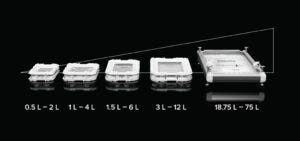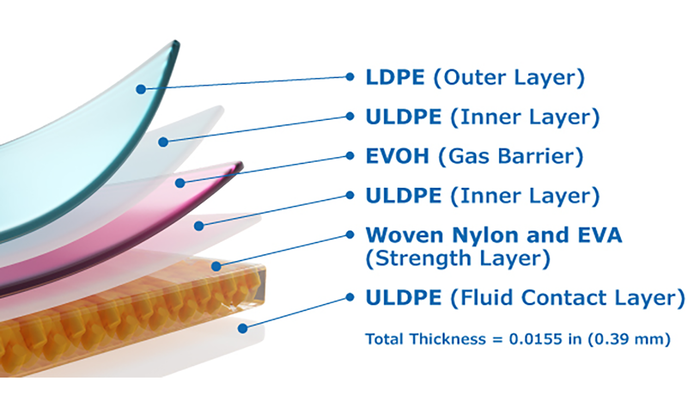
Figure 1: Containers in the Celsius platform are scalable to 75 L.
Bulk drug substances (BDS) often require frozen storage to preserve the integrity of biological material. Cold-chain management is particularly important given recent trends toward increasing globalization and decentralization and diversifying modalities. A secure cold chain is essential for maintaining a product’s critical quality attributes (CQAs) — such as drug product stability, integrity, and purity — and to prevent costly product losses.
Scaling Up the Cold Chain
Frozen storage at commercial scale presents its own challenges; facilities must be able to handle large volumes of BDS without jeopardizing product CQAs and operator safety. Currently, manufacturers have two main choices for storing and shipping large volumes of frozen materials:
• using large-scale, multiuse stainless-steel freeze containers
• multiplying the number of small-/medium-scale containers (single-use containers or bottles).
Stainless-steel containers are robust but must be cleaned and validated between batches. They also are bulky, complicated to scale, and require reversed logistics for continued use. Increasing the number of smaller containers limits process modifications and optimizations required to scale to larger containers. However, handling a multitude of containers is logistically challenging; the larger the number of containers, the more time is spent connecting and disconnecting them from up- and downstream processes, usually under aseptic conditions. Such activities tie up valuable employee hours and increase the potential for handling-associated errors, incorporating inefficiencies into a process.
Single-use freezing containers such as the range of Celsius containers from Sartorius are increasingly recognized as viable options for freeze and thaw processes because of their ease of use, scalability, and robustness. Although current large-volume process flows have been developed by linking standalone equipment and consumables, such operations are not part of a holistic, end-to-end platform that considers an entire BDS lifecycle, including filling, freezing, thawing, and shipping.
Cold Chain Management: Scaling Up to Large Volumes
Large-scale storage and shipment of frozen BDS are associated with significant challenges related to process efficiency, safety and product integrity, logistics, cost of ownership, and flexibility.
Process Efficiency: Drug developers need solutions that do not require handling tens or hundreds of freezing containers and related processes for connection, disconnection, and storage. Moving toward a “true,” purpose-built, large-scale solution to simplify operations will be beneficial.
Safety and Product Integrity: Maintaining the safety and integrity of a BDS is a top priority throughout its entire lifecycle. Safety assurance is especially important when technicians need to handle a number of small containers; to multiply containers is to multiply risks by adding handling steps, increasing opportunities for human error.
In the evolving regulatory landscape, the robustness and integrity of systems used in BDS management will be increasingly scrutinized by authorities. For example, the latest Annex 1 from the good manufacturing practice (GMP) guidance (released in August 2022, Section 8.138) points specifically at extreme conditions such as freezing and thawing processes (1).
Logistics: Manufacturers require effective tools and equipment for safe, easy moving and storage of hundreds of liters of critical products. BDS can be in transit for as long as three to four days and can be exposed to warm external environments. Transport of frozen BDS must be carried out without loss of container integrity (which creates a source of potential contamination) while maintaining a stable temperature to protect a product’s CQAs.
Cost of Ownership: Cost is a significant driver for many facilities. A chosen solution must be cost-effective in terms of upfront investment, the overall cost of goods, and its ability to mitigate risks and prevent costly cold-chain deviations.
Flexibility: Manufacturers need to ensure that they can continue to handle smaller scale volumes even after investing in solutions for large-volume freeze–thaw operations. A system capable of high performance across all required volumes is more cost effective and can prevent potential roadblocks following future process changes.
Simplifying Large-Volume Cold-Chain Management
To address the above challenges, Sartorius developed the Celsius FFT (flexible freeze and thaw) modular platform for handling volumes across small- and large-scale freeze and thaw processes. The platform comprises a freezer, a dispensing system, a mixer, and a lift to manage palletized Celsius FFT containers from 2 L to 75 L for full flexibility (accommodating 2 L to 300 L per pallet) (Figure 1). As such, it is a true end-to-end platform, purpose-built to handle multiple containers and support scale up. The system was developed with a no-touch handling approach, facilitating safe, easy, scalable, and efficient management of large volumes of BDS.
Flexible Configuration for Large Scale: The Celsius FFT platform’s unique modular design provides a single platform for consistent operations across scales. Therefore, it simplifies the large-scale storage and shipping of frozen BDS. The palletized configuration supports large-volume BDS management by offering scalability (with connected benchtop systems and smaller-scale FFT units) while maximizing process efficiency by limiting operator handling and avoiding the use of multiple containers.
All FFT container sizes from 2 L to 75 L (40 L to 300 L per pallet) can be used with the Celsius FFT platform, enabling manufacturers to remain agile and change batch sizes quickly, easily, and without costly investment into alternative cold-chain systems. Thus, the tailor-made design supports seamless and flexible end-user experience at all scales.
Robust by Design: Our latest generation of Celsius products was developed with an ethos of robust by design (2). The three pillars of our robust-by-design approach are
• comprehensive characterization of all materials used to build our containers
• design simulations to assure the minimum level of stress in the most sensitive areas
• application testing to ensure that containers are reliable across all use cases and real-life settings, including multiple freeze–thaw cycles and shipping over multiple days in high-temperature environments.
The robustness testing approach continues across scales. Process continuity and product safety are enabled by an optimized container design, qualified according to stringent recognized standards (such as ASTM D4169, which provides a uniform practice for evaluating the performance of shipping container units during distribution).
Automation: For critical process steps, such as BDS filling or freezing, automation enables better traceability of valuable drug substances. Batch reports on key steps (filling, freezing, and thawing) improve traceability, and audit trails simplify preparation of documentation required during audits. Automated processes also optimize batch processing time and productivity, leading to cost savings, particularly in high-throughput operations.
End-to-End Platform: The Celsius FFT platform has a no-touch concept from start to finish: lift, fill, freeze, ship, drain. The system is purpose-designed to limit operator interactions, eliminating a potential source of cold-chain deviations and improving safety. Additionally, because it is part of a holistic platform, processes are streamlined, inefficiencies are eliminated, and performance is consistent across scales. Those features reduce the total cost of ownership compared with that of conventional processes by reducing employee hours required to manage process steps and guarding against potential business impacts of product losses. Additionally, using closed, sterile, single-use systems and automated filling eliminates manual filling steps under costly laminar air flows, reducing the time, cost, and facility footprint required to maintain those systems.
Securing Cold-Chain Integrity
A poorly managed cold chain can result in costly delays and expensive losses. Such risks are amplified at large scales for which drug developers might need to store and ship hundreds of liters of high-value drug products. Implementing robust single-use containers is key to securing the integrity of the cold chain while offering the scalability, flexibility, and ease of use necessary for effectively working at a commercial scale.
The Celsius FFT end-to-end platform is designed to streamline handling of large volumes of precious BDS. Browse the Celsius portfolio to learn more about the platform’s capabilities at https://www.sartorius.com/en/products/fluid-management/frozen-storage-shipping/commercial-scale-solutions.
References
1 Annex 1: Manufacture of Sterile Medicinal Products. The Rules Governing Medicinal Products in the European Union:Volume 4 EU Guidelines for Good Manufacturing Practice for Medicinal Products for Human and Veterinary Use. European Commission: Brussels, Belgium, 22 August 2022; https://health.ec.europa.eu/system/files/2022-08/20220825_gmp-an1_en_0.pdf.
2 Monstier M, McLaughlin K. Robust by Design: Addressing New Challenges in Bulk Drug Substance Management, 2022; https://www.sartorius.com/en/robust-by-design-white-paper-en-b-pdf-1345580.
Marion Monstier ([email protected]) and Sebastien Chaussin ([email protected]) are product managers of freeze and thaw at Sartorius. Katy McLaughlin ([email protected]) is a scientific content writer at Sartorius.








